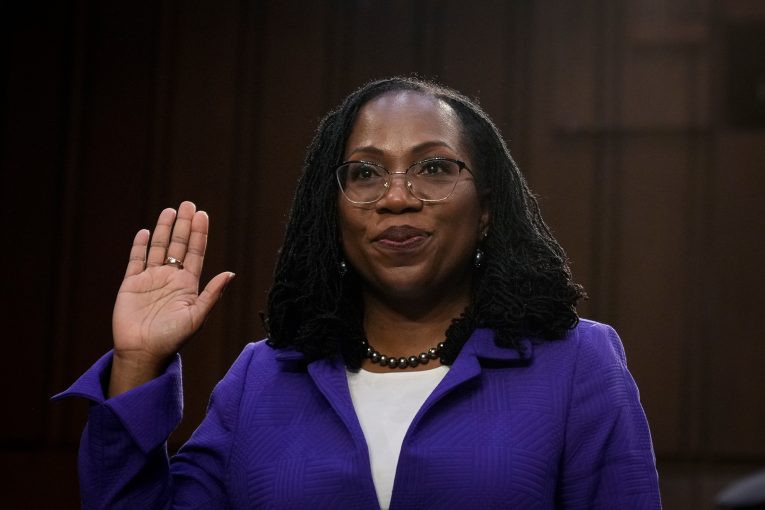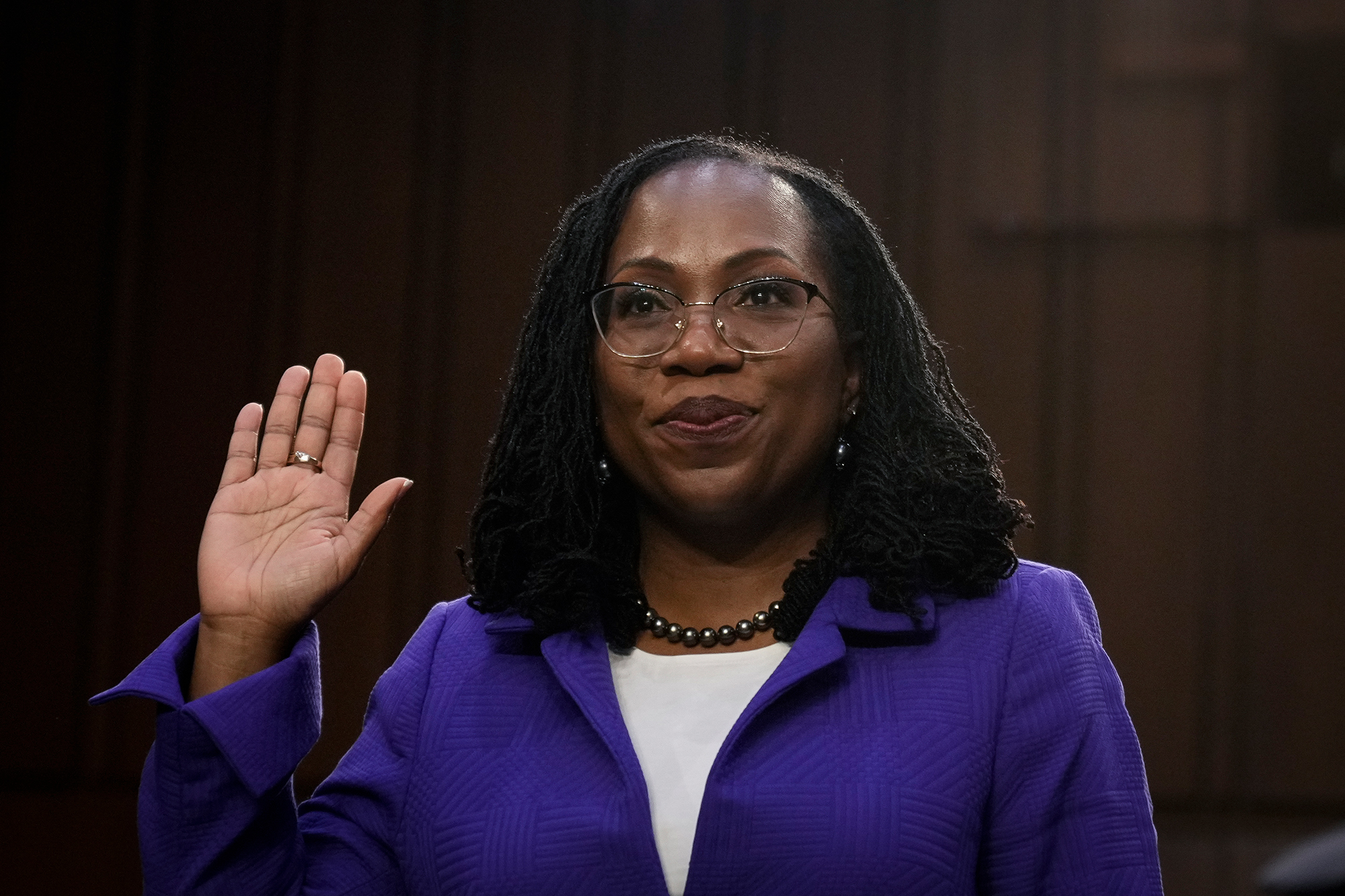

By David M. Greenwald
Executive Editor
I would be remiss if I did not reflect on the historic nature of the confirmation of Ketanji Brown Jackson. A lot has been made over the fact that she is the first Black woman on the Supreme Court. But it actually goes a lot further than that.
As I pointed out to my students, it was only within my lifetime that the first woman, Sandra Day O’Connor, was named forty years ago to the Supreme Court. Since then, there have been six women named to the court, and with a 5-4 split currently, we now have basic gender equity for the first time.
Up until 1981, two of the three branches of government (at least at the top) were exclusively male and, with just a single exception (Thurgood Marshall), white. It was only in 1984 that the first woman was nominated as a major party VP candidate, 2016 that a woman was nominated as a major party Presidential candidate and 2020 where a woman actually was elected to Vice President.
Just as the election of Barack Obama did not signal that the US was now a colorblind society, the election of Kamala Harris and nomination of Ketanji Brown Jackson do not mean that we live in a society with equal rights for women—but it is historic progress that has been far  too long in the making.
too long in the making.
Much as we might applaud the moment, I fear that this process signals very dark times ahead for our democracy.
The vote was 53-47 with just three Republicans crossing the line—the three more “moderate,” or perhaps a better term would be “less partisan.”
Senator Lisa Murkowski (Alaska), Susan Collins (Maine) and Mitt Romney (Utah) were the only three Republicans to cross the line. And they issued a warning that confirmations have become way too partisan.
Senator Collins for instance said this week that “we need to get back to what Congress clearly delineates as the role for the Senate versus the president.” She believes the president should get “considerable deference” on high court nominees.
It wasn’t that long ago that this occurred. The Senate confirmed Antonin Scalia 98-0 and Ruth Bader Ginsburg 96-3.
For those who like to blame both sides this issue – fine. Let’s give blame where blame is due here—both sides.
You can pick your point in history to lay the blame. I will pick the Merrick Garland nomination in 2016. (You could go early to Abe Fortas in 1968, Robert Bork in 1987, and Clarence Thomas in 1991 who was eventually confirmed).
I pick Garland because it seemed to start the chain reaction of consequences—the Republican majority would not even allow his nomination to come to the floor. When Trump won, he got to make the pick instead.
The Kavanaugh confirmation process was brutal and partisan. Democrats were angry but powerless to stop the last-minute confirmation of Amy Coney Barrett. And Republicans retaliated with the contentious Jackson appointment that they were likewise powerless to stop.
Barring a major surprise, that will be the last Supreme Court appointment Biden will get this term.
Senator Romney has it right here.
“The real question for me will be when you have a party in power in the Senate that’s different from the president, how are we going to get the judiciary filled?” he said. “That’s why I think Sen. Collins raised the issues she did.”
That’s basically where we are now.
The Hill reported this week that Senator McConnell on Tuesday “declined to say whether he would allow President Biden to fill another court vacancy if Republicans win back the Senate majority in November.”
“What I can say with pretty great certainty is the president who ran as a moderate and who has governed as Bernie Sanders would, would have to spend the last two years of his term being a moderate,” McConnell told reporters when asked if he would commit to holding a vote on another Biden Supreme Court nominee if he again becomes Senate majority leader in 2023.
The reality is that there is no Democratic nomination that will be moderate enough for McConnell. We can see both sides of this as well, as Schumer is now likely to do the same if he gets the opportunity in the future.
As the Hill put it: “This has raised the prospect that McConnell may play the same card again or that Schumer or a future Democratic majority leader may do the same to a Republican president. “
Senator Lindsey Graham is at least honest about it. He said on Monday, “Republicans would not have allowed Jackson to join the Supreme Court if they controlled the agenda.”
“If we get back the Senate and we’re in charge of this body and there’s judicial openings, we will talk to our colleagues on the other side. But if we were in charge, she would not have been before this committee. You would have had somebody more moderate than this,” he said.
Like I said, the Republicans were not willing to put Garland on the court—with a reputation for moderation.
Senator Murkowski worries that “these kinds of threats could undermine the independence and influence of the Supreme Court over the long run.”
She said that she “doesn’t know if future presidents will be able to put new justices on the court when their party doesn’t also control the Senate.”
“Think about what that will do to the court,” she said. “Think about the position that the legislative branch will put the judiciary in if we do not allow that to proceed.
“It would mean that you would have a court that is handicapped. Remember, these are three separate but equal branches and we would be handicapping one of the three out of political motivation,” she said. “What happens when you have a new president come in and a new Senate, a new majority in the Senate, and turnabout is fair play?
“Eventually you get to a place where you cannot confirm justices, and they don’t live forever. What are we doing? Killing off the court. We’re heading in a place that I think is dangerous for the courts.”
Fine, both parties caused this. But this is not healthy and there is really is no way out of it.
“In many ways, Congress right now is reflecting an increasingly polarized America. So I think it starts back home with people realizing that we need to work together to identify common problems and be more respectful and civil in our dialogue,” Collins said.
The group in the middle, however, is not large enough really to overcome this era of hyper-partisanship. And I think that is to the detriment of the country.







Except we’re not allowed to comment about that.
Well that reputation can be put to rest because as Garland has been anything but moderate as the Attorney General.
That would be me and it is “fine”.
That must of been hard for you to admit.
“That must of been hard for you to admit.”
Not really. It’s quite obvious that partisan is an escalation. Getting out of the trap, is going to be tricky if not impossible.
I will give you credit, this was one of your more balanced articles.
“Well that reputation can be put to rest because as Garland has been anything but moderate as the Attorney General.”
Do you have any examples?
Right off the top of my head Garland put out a memo directing the FBI to investigate parents as domestic terror threats because of their participation at school board meetings.
Lots of elected officials have been threatened in recent years. I believe that your complaint is based on a narrow interpretation of what he did.
That a competent person was chosen, confirmed, I’m good…
That she will be a competent jurist, and focus on the law, not politics, I am reasonably hopeful…
But “celebrate“? Just because she is a Black woman? No…
Glad it happened, despite ‘3 strikes’, in the minds of some (Black, woman, appointed by a Democrat president)… feel reassured that some things can be done on merits, rather than prejudices (pun intended), raw politics, yes.
Some will now push for the concept that we need a female/T-G/Bi ++ , POC, atheist, whatever, for the next nominee? Silly me… am hoping for a competent jurist, as it appears we have just achieved…
And, if those who push for that ‘win’, will I “celebrate“? No…
Couldn’t agree more. Actually, with your entire comment.
And yet, this is the “norm” these days. Even in local political races.
Even Republicans (more subtly) try to get in on “the action”.
I think they’re fooling themselves, as to how this type of pandering is viewed outside of their own circles. (Even California recently rejected Affirmative Action.)
Then again, there was that school board “recall”, in Davis. (I won’t get into that, unless you want to.) 🙂
OK, but doesn’t the fact that Biden said he was going to nominate a black women temper that victory somewhat? For instance, if Newsom said they were going to appoint a Jew to run my agency, and I was appointed to run the agency, I’d feel a bit weird about it, even if I were fully qualified (and Lord knows I’m not). I’d also wonder how many people thought I’d got the job because I was a Jew and resent me for the special treatment I’d received.
It’s weird: for years I thought Anton and Scalia were two different people. That’s a joke sort of, but I really did.
Ya THINK ?!!!???
I read this in-depth article not long ago that explained why this shift has occurred over the last couple of decades. It was very inside-baseball and I couldn’t explain it and I forget what source it was in, but it showed how the political forces have slowly pushed the process from partisan compromise by the middle-majority to partisan divide and shut-down attacks from both extremes. It painted a very dark future.
I think there is, but I’m also pretty sure it will never happen. That is rank-choice voting in all levels of government. That will allow third-party candidates a chance to start to break into the political system, because there won’t be this stigma of ‘throwing away one’s vote’ or even ‘giving it to the other side’ by vote splitting. Neither of which are ‘real’ democracy, but only a excretion of how voting is structured. The problem is of course the extreme power of the two political parties. The will likely never give in an inch to save our country from implosion because neither party wants to give up an inch of power.
That is SO 1990’s . . . and before . . .
I don’t actually agree with that — although defining ‘middle’ makes that arguable. I think the problem is our means of communication and on-line echo-chambers that feed ourselves back to ourselves and create extremes where they need not be, as well as the increasing desire to shut down ‘wrong’ opinions rather than to find common ground. The entire societal paradigm needs an overhaul.
Yes, it does. There’s a brief reference to this (type) of issue (regarding admission to one of the UC systems, as I recall) in the movie “Lady Bird” – set in Sacramento.
Not exactly a racist movie.
Something to the effect of, “Yes, Miguel – I’m sure that they didn’t know“. (Paraphrasing.)
That’s exactly how I view a prior candidate’s successful candidacy for president of the United States. Strangely enough though, he seemed to kowtow to the establishment, especially once in there. (Maybe the only way to actually retain power? Though it didn’t work out so well, for him.)
Though truth be told, some of his supporters seemed to “overlook” his flaws, due to expectations that he would deliver for them. Which he did.
Yeap, and the reason that most people hate politics, even if they won’t admit it when putting forth political arguments.
Newsom, vs. (who was that potential replacement, again)?
For that matter, was the “governator” better than Gray Davis? (And, why are so many people named “Davis”?)
I actually bumped into Gray Davis in Los Angeles (shortly after the recall), approached him (and said) “the same thing is occurring with your replacement” (words to that effect, though I don’t recall the specific issue). He was by himself, when I approached him.
He seemed to welcome the contact, even before I said anything.
(Normally, I don’t do this type of thing, but I didn’t like the recall, in his case.)
This was in the days before the Democrats went nuts, regarding some issues at least. Way before they “woke up”, for one thing.
One thing I would say (regarding this Supreme Court justice) is that she seems enthused about the job. That alone is a positive sign (in my opinion). And she’s obviously qualified, and doesn’t seem to be an extremist.
I’m tired of these people not even smiling, when being nominated for the job. Turning into something negative, partly as a result of their own personality. (Though maybe that’s hard to do, when you’re simultaneously being accused of sexual harassment, by someone who at least appears to be credible.) Not sure why it’s “worth it” to go through that for a job, regardless of whatever the facts actually were.
Supreme Court nominations and their votes:
Ketanji Brown Jackson (53-47)
Amy Coney Barrett (52-48)
Brett Kavanaugh (50-48)
Neil Gorsuch (54-45)
Merrick Garland (Senate leader refused to allow a vote)
Samuel Alito (58-42)
Elena Kagan (63-37)
Sonia Sotomayor (68-31)
Stephen Breyer (87-9)
Ruth Bader Ginsburg (96-3)
Clarence Thomas (52-48)
John Roberts (78-22)
David Souter (90 – 9)
Antonin Scalia (98 – 0)
Robert Bork (42-58)
Wow – what a difference, regarding some of them.
I don’t even remember Souter.